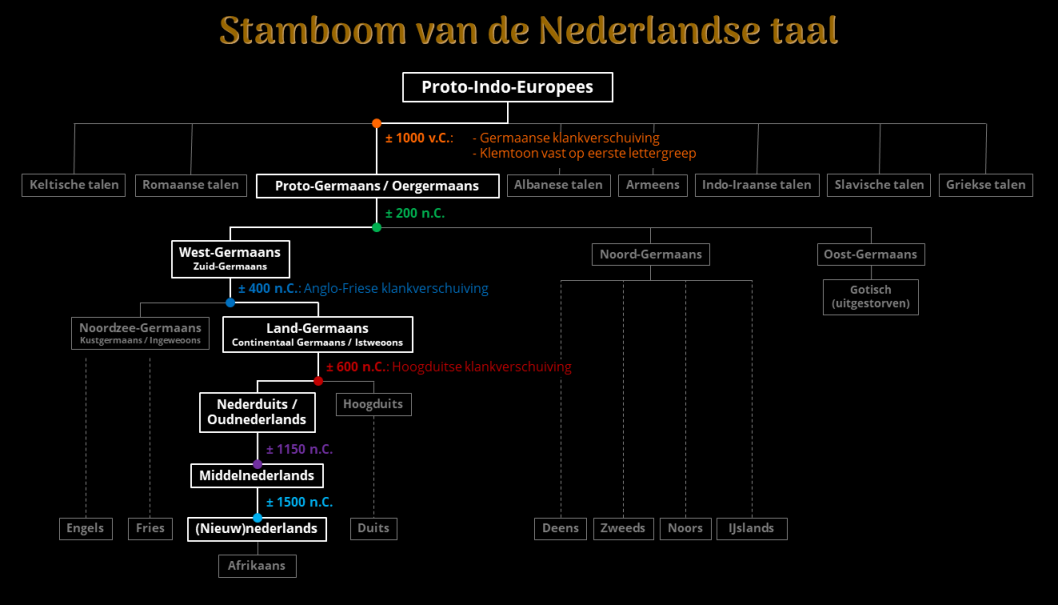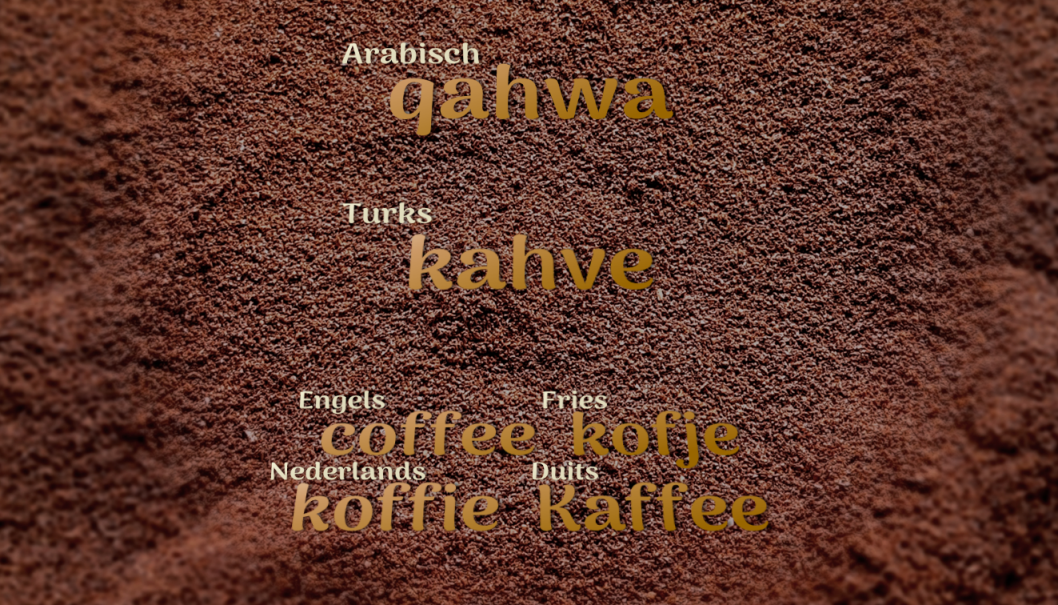WEST GERMANIC
West Germanic
Linguistics
| 30-08-2019
There are these moments when very common words suddenly strike you. The word all at once seems strange to you, or it reminds you of another word and it makes you wonder: would they be related?
For example, in Taal op dift ('Drifting language', unfortunately not available in English, for as far as I could find), I recently read a quote from the Act of Abjuration. In that quote was the phrase in stede van, which means 'instead of'. I have never come across that expression in contemporary Dutch, where in plaats van is used instead. In Frisian, English and German similar sayings are still very common: ynstee fan, instead (of) and anstatt all look somewhat alike. Is it true that those words have a common origin? Why is the expression no longer common in Dutch, but still in Frisian, English and German?
It is not surprising that similarities can be found between Dutch, Frisian, English and German words. Together (if you wish with even more languages, such as Afrikaans / South African Dutch and Scottish / Scots) they form the West Germanic descendants of Proto-Indo-European, a kind of 'primordial language' from which hundreds of languages descend. Simply put, the Dutch, Frisian, English and German from the same family. Just like brothers and sisters, these languages look somewhat alike, but they have also experienced their own development.

Anyway, there is a kinship between the West Germanic languages and that can be seen more clearly one time than the other. Each of the languages has also undergone its own influences, depending on issues such as nationality, rulers and neighboring countries. There are words that have been adopted - adapted or not - from Latin and Greek, French and Spanish and many other languages. For example in science, in the judiciary, by trading, or by importing unknown products and more or less taking over the original name; think of coffee or broccoli.

This brings me to my quotation of sources. Because for all the pieces in this section I mainly draw from the same sources, I mention them here in one go for all those pieces. Then I don't have to worry about that all the time when typing those pieces; so I can keep up a cheerfull flow of typing. Well, first of all, I will use the unsurpassed etymologiebank.nl, where you will not only find information from various etymological standard works, but also, for example, dialect and thematic dictionaries. Then of course there is the Online Etymology Dictionary, which by the way offers a very handy extension for Chrome users. Thirdly, I will regularly consult the Digitales Wörterbuch der deutschen Sprache.
For example, in Taal op dift ('Drifting language', unfortunately not available in English, for as far as I could find), I recently read a quote from the Act of Abjuration. In that quote was the phrase in stede van, which means 'instead of'. I have never come across that expression in contemporary Dutch, where in plaats van is used instead. In Frisian, English and German similar sayings are still very common: ynstee fan, instead (of) and anstatt all look somewhat alike. Is it true that those words have a common origin? Why is the expression no longer common in Dutch, but still in Frisian, English and German?
It is not surprising that similarities can be found between Dutch, Frisian, English and German words. Together (if you wish with even more languages, such as Afrikaans / South African Dutch and Scottish / Scots) they form the West Germanic descendants of Proto-Indo-European, a kind of 'primordial language' from which hundreds of languages descend. Simply put, the Dutch, Frisian, English and German from the same family. Just like brothers and sisters, these languages look somewhat alike, but they have also experienced their own development.

Family tree of the Dutch language: a highly simplified schematic representation of reality
By the way: for convenience's sake, I now assume that there are hard boundaries between languages and that you can speak of, for example, 'the Dutch language' or 'the German language'. Those are standard languages, the languages as they are recorded in vocabularies and grammars. In reality, languages are not so clearly defined and there is rather a continuum, with all kinds of local variations. What we now often call dialects is probably closer to the 'original' situation; standard languages only have been the standard for a relatively short time and according to some are already over the hill.Anyway, there is a kinship between the West Germanic languages and that can be seen more clearly one time than the other. Each of the languages has also undergone its own influences, depending on issues such as nationality, rulers and neighboring countries. There are words that have been adopted - adapted or not - from Latin and Greek, French and Spanish and many other languages. For example in science, in the judiciary, by trading, or by importing unknown products and more or less taking over the original name; think of coffee or broccoli.

The origin of the word coffee in four West Germanic languages
In a section that I call West Germanic, I want to look at what connections there are between words that strike me. Not necessarily very scientifically, but I will base it on information from mainlyetymologicalEtymology studies the origin of words.
dictionaries. I've found those interesting since I discovered them in the library as a teenager, and nowadays they can be consulted online for free!
This brings me to my quotation of sources. Because for all the pieces in this section I mainly draw from the same sources, I mention them here in one go for all those pieces. Then I don't have to worry about that all the time when typing those pieces; so I can keep up a cheerfull flow of typing. Well, first of all, I will use the unsurpassed etymologiebank.nl, where you will not only find information from various etymological standard works, but also, for example, dialect and thematic dictionaries. Then of course there is the Online Etymology Dictionary, which by the way offers a very handy extension for Chrome users. Thirdly, I will regularly consult the Digitales Wörterbuch der deutschen Sprache.
In two weeks I will publish the first piece in the West Germanic section: about karnemelkse gortepap, sûpengroattenbrij and buttermilk…
